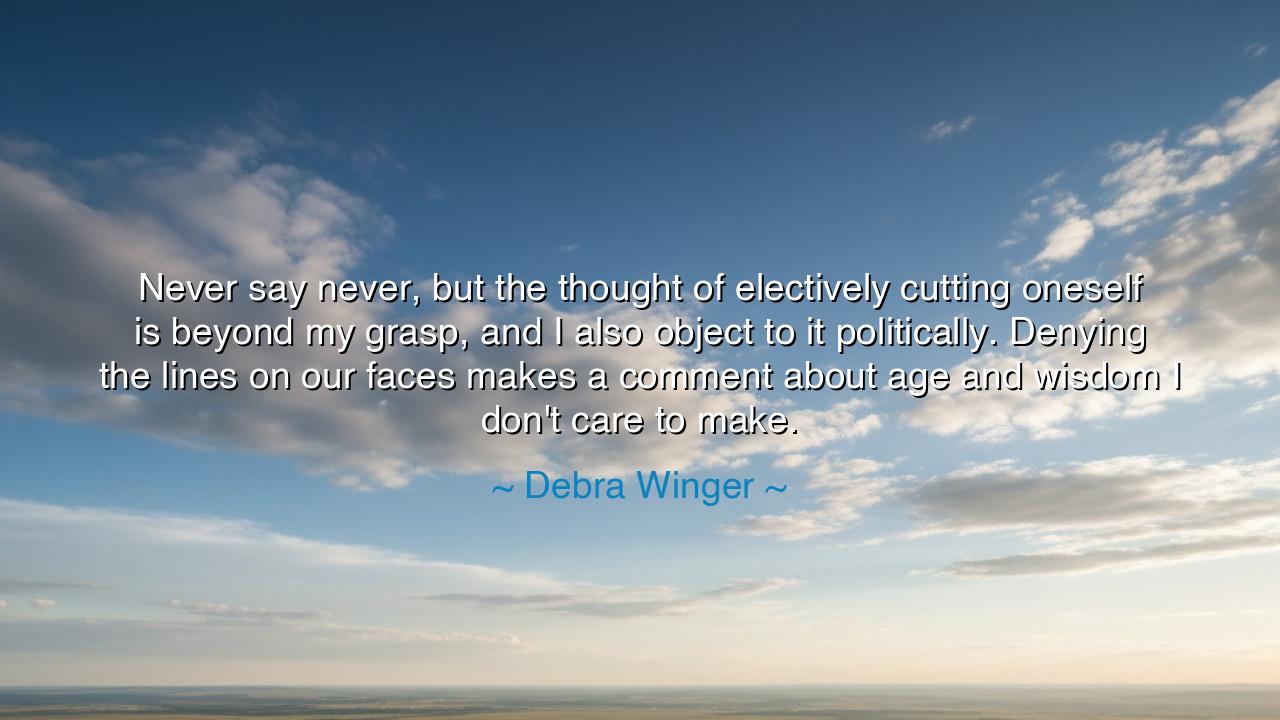
Never say never, but the thought of electively cutting oneself
Never say never, but the thought of electively cutting oneself is beyond my grasp, and I also object to it politically. Denying the lines on our faces makes a comment about age and wisdom I don't care to make.






Hearken, O children of the ages, to the candid and reflective words of Debra Winger, who speaks of the courage to embrace the passage of time and the natural marks it leaves upon the body. She teaches that to deny the signs of age—the lines on our faces—is to reject the testimony of experience, the wisdom forged by years, and the integrity of a life fully lived. True strength lies in accepting oneself with all the evidence of survival, struggle, and growth.
Winger reminds us that the temptation to electively cut oneself, to erase the visible reminders of life’s journey, is a thought that surpasses her understanding and defies her principles. She rejects the notion not only personally but politically, recognizing that the act carries implications about society’s values and its obsession with youth and appearance. In her refusal, she honors the natural order, the dignity of authenticity, and the profound truth that time itself imparts meaning.
Consider the life of Helen Mirren, who has embraced her years with grace, allowing the lines and marks of life to speak for themselves. In doing so, she conveys that beauty, insight, and strength are not bound to youth alone, and that wisdom emerges in full measure only when one acknowledges the passage of time. Her visage tells a story, and in her acceptance, she confounds the superficial standards that seek to erase the testimony of lived experience.
Even in everyday life, this principle holds. Each scar, wrinkle, and imperfection is a testament to endurance, to lessons learned, and to moments survived. To seek their erasure is to deny the narrative of self, while to accept them is to claim the mantle of authenticity, courage, and the quiet authority that comes from living fully. Winger’s words teach that the marks of age are not blemishes, but honors of wisdom.
O children of the future, carry this teaching in your hearts: do not fear the visible signs of life’s passage, nor seek to erase the evidence of your journey. Honor the lines, cherish the lessons they signify, and recognize that true strength and insight come not from concealment, but from embracing the authenticity of your being. In this, one embodies the courage to live openly, to age gracefully, and to cultivate the wisdom that time alone can bestow.
If you desire, I can also craft a visual, ancient scroll-style presentation of this passage to capture the heroic, timeless, and deeply evocative essence of Winger’s teaching on authenticity, aging, and the courage of wisdom.






TTNguyen Thi Trang
I’m curious about the link between appearance and wisdom. Does erasing signs of age unintentionally undermine the respect or authority associated with life experience? Could it also distort our collective perception of aging by presenting unrealistic images of what maturity looks like? I’d like to explore whether embracing visible aging could shift cultural values toward honoring, rather than fearing, the passage of time.
YNYume Nijino
This raises questions about autonomy and judgment. While Debra Winger objects to elective procedures, should individuals be criticized for making choices about their own bodies? How can we balance respecting personal freedom with acknowledging the societal messages these choices convey? I’d like to hear perspectives on whether choosing cosmetic surgery is an act of empowerment or a symptom of external pressure.
TPThi Tham Pham
I feel intrigued by the political dimension of this statement. Is altering one’s face not only a personal choice but also a cultural or political act? Does cosmetic surgery reinforce harmful societal standards about beauty and age, or can it be a legitimate form of self-expression? I’d like to explore how personal decisions about appearance intersect with broader social and political messages.
Q7vo Tran Le Quyen 7E
This makes me reflect on the societal pressure to alter one’s appearance with age. Why is there such a stigma attached to natural aging when it represents experience and wisdom? I wonder if our culture’s obsession with youth has created an environment where people feel forced to erase signs of time rather than embrace them. Could normalizing aging help shift attitudes toward self-acceptance and authenticity?